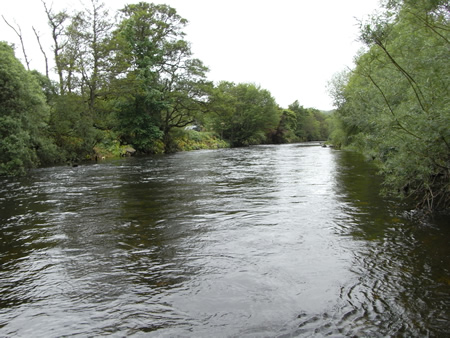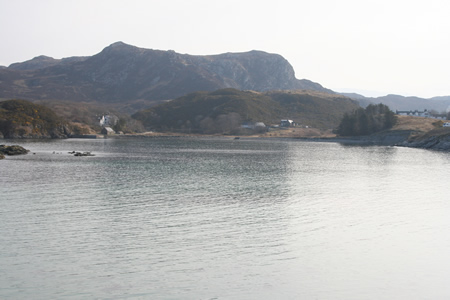This morning, woken by the rain pattering against the windows, I looked blearily at the webcam on this website at about 7am to see that the river was running high and brown, and it has continued to rise all morning. At 1400 it was at 5’0″ in the Red Brae (that’s 3’6″ above the lowest part of the Wall) and still rising. The weather map is showing that the 7 degree C lift in temperature is likely to be sustained, so we can expect the river to run high for a few days as the copious amounts of snow in the corries leak out into the burns and fill the main stem of the River.
This photo was taken from on top of the Aqueduct looking upstream at Beeches Pool (Castle Beat). The pool is fished from the left bank, where wading is easy on fine gravel. The best lie at this height is close to the willow trees on the right bank in the foreground of the picture. This is a big fish lie, as has been demonstrated by John Wood’s 17lbs fish and a very much larger salmon lost by Alec Towns after an epic (and witnessed) struggle in July 2013.
After John Wood’s stunningly beautiful 17lbs salmon from just above the Aqueduct (technically in Beeches Pool), not much happened before last night’s change in temperature which came with the arrival of a south-westerly airstream. In fact the river level droppped away for the rest of the week and the water became crystal clear, more like the Cascapedia or St Jean rivers in Canada than our little South Esk. There were still a few kelts about, which will likely have dropped back to the sea in this spate. I think this change is in climate rather than just a bit of warmer weather, as we move from winter into spring. If there are salmon off the coast waiting to enter the river, there really could not be a better moment for the coincidence of their arrival and the current snow-melt. If there are fish, then it is highly probable that beats all the way up to Gella, and perhaps beyond, will have fresh salmon in their pools during the coming week. Always the optimist!
Talking of sea trout, we should start to see the odd one appear in catch returns very soon now. Usually the Kinnaird beats record the first of these fish, and late April is about the time.
Looking back on the first two months of the 2013 season, my view is that the River isn’t doing badly at all. Taking the Marine Scotland tagging catches at Kinnaird (22 fish to date), plus fish tagged at sea and now in the river (one or two fish), plus the declared catch from the Kinnaird beats (about 40), plus fish caught above Kinnaird Dam (Kintrockat 1: Inshewan 2 and Finavon 1) we are looking at the declared catch of spring fish, caught and returned to date, at about 70 MSW salmon. Given the conditions, that is not a bad start to the year, and of course there may be other fish I don’t know about.
A minor digression: While the river was fining down in the latter half of last week, I was in the far north-west highlands, giving talks, and visiting rivers and people in the area covered by the West Sutherland Rivers Trust. I stayed at the Scourie Hotel, which must be one of Scotland’s few remaining west coast fishing hotels, although it is great news that the Loch Maree Hotel has just reopened. Even in mid April, with night temperatures well below freezing, the Scourie Hotel was nearly full of optimistic fly fishers from Yorkshire, Nottingham and Glasgow. Their catches weren’t great – just a few hardy brown trout from Scourie’s famous hill lochs – but the crack was, and I was reminded of how important to the remote rural economy tourist angling is, especially in ‘shoulder season’ months like April. In the area between Laxford and Loch Ewe, it is particularly noticeable how damaging the collapse of sea trout stocks has been to the local economy. Let us hope that one day the sea trout will return in the abundance that I remember them in lochs such as Maree, Na Shealagh, Oscaig and Stack only 40 years ago. Hotels will reopen, take on ghillies, guides and boatmen, and local communities will immediately benefit. For that to happen, we humans will have to start behaving differently in the way we manage the coastal environment. No more said!
The view across Scourie Bay to the hotel. The Scourie Hotel has served many generations of game fishers and continues to thrive. The contribution this hotel makes to the local economy provides a reminder of how different the west highlands could be if more hotels like this were available to game fishermen and the general tourist.
When I returned from the north-west last night it was perishingly cold with a freezing haar and a river that didn’t suggest “fish”. By this morning all that had changed.
TA

